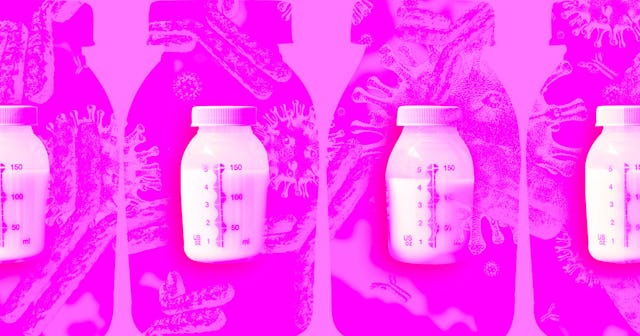Antibodies In Breast Milk May Remain For 10 Months After COVID-19

Raising little ones during the pandemic has been a terrifying experience, especially as we wait for vaccines for kids under 12. This is particularly true for babies and toddlers, who may not be eligible for vaccines till 2022. But if you are a breastfeeding parent, I have some good news for you: it’s likely you are protecting your child via your breastmilk.
It’s a well known fact that breastmilk provides antibodies and other immunological protections for children. So it makes sense that, in theory, breastmilk would contain antibodies for COVID-19, if the breastfeeding parent was infected or vaccinated. Thankfully, research has already found that to be true.
Several studies have come out showing that people who are infected with COVID-19, or who have been vaccinated against COVID-19, have COVID-19 antibodies in their breastmilk. But new research has found that these antibody levels are durable, and that they are not only present in breastmilk, but may help neutralize the virus if your baby encounters it.
All of this is based on research from Rebecca Powell, from Mount Sinai Hospital in New York. Although not published yet, Powell’s research was presented at the Global Breastfeeding and Lactation Symposium on September 21st.
As New Scientist explains, Powell’s research team looked at the breastmilk of 75 breastfeeding parents who had recovered from COVID-19. They found that 88% of these breastmilk samples included IgA antibodies to COVID-19, which are the type of antibodies that are believed to be capable of neutralizing the virus. What’s more, these antibodies were present in these parents’ milk for up to 10 months.
“It means that if you continue breastfeeding, you’re still giving those antibodies in your milk,” Powell explained at the conference, according to The Guardian.
That. Is. Awesome.
Powell’s team also previously found that breastfeeding parents who were vaccinated had strong antibodies in their breastmilk, too. According to data (published, but not peer reviewed), Powell’s team looked at antibody levels in breastfeeding parents vaccinated with Pfizer, Moderna, and Johnson & Johnson.
Nastasic/Getty
Everyone who was vaccinated with Moderna had IgG antibodies in their milk, which are coronavirus-specific antibodies. 87% of those vaccinated with Pfizer had IgG antibodies as well. 71% of Moderna recipients, and 51% of Pfizer recipients had IgA antibodies, which are the type believed to block the virus specifically.
Breastfeeding parents who had received the Johnson & Johnson vaccine also had promising antibodies, though their numbers were lower. 38% of Johnson and Johnson recipients had IgG antibodies, and 23% had IgA antibodies.
Powell explained the potential difference for how the two vaccines performed: “We know that the level of antibodies produced by RNA vaccines is extremely high compared to other vaccines. You don’t necessarily need that much antibody to protect you from infection, but the milk effect really depends on there being a lot of antibody in your blood that’s transferring into your milk. Because there’s a lower level stimulated by the J&J vaccine (a viral vector vaccine), that’s probably why there’s very low levels in the milk.”
Whatever the case may be, breastfeeding your baby during the pandemic is one the best things you can do for them. Remember, although COVID is generally milder in babies and young children, some children can get severe cases of COVID. As many as 1 in 10 babies who contract COVID will be hospitalized, according the The Guardian. And we don’t know yet the full extent of the long-term health impacts that COVID can have on babies and young children.
Of course, not all parents can breastfeed their babies, and that’s okay! First of all, it should be noted that any amount of breastmilk is beneficial to your child, so even if you are only able to breastfeed part-time, you are going to be passing on these benefits to your baby. Pumping your milk and feeding it to your baby works too, even if you only pump once a day. But even if you aren’t able to breastfeed or don’t want to for any reason, there are plenty of other ways to keep your baby healthy and safe.
The CDC recommends that your baby be surrounded by vaccinated adults. If someone in your household tests positive for COVID or was exposed to it, they should quarantine. If that’s not possible (or if you are breastfeeding and wish to continue), you should wash your hands and wear a mask around your baby.
Most of all, if you have any questions about keeping your baby safe during the pandemic, you should reach out to your baby’s pediatrician. They can answer any questions you may have about breastfeeding or protecting your baby in general from COVID-19.
This is definitely a crazy and scary time to be parenting a little one right now. But you’ve got this. And if you are breastfeeding, keep at it as long as you can. Every drop helps.
This article was originally published on